Canine Heartworms and Heartworm Prevention for Dogs
Heartworms
Heartworms can be found in cats or dogs, but they are generally more often found in dogs, as dogs tend to spend more time outside than cats. No matter where you live, your dog is susceptible to heartworm disease, and yes it is 1) a disease and 2) worms.
Typically heartworms found in female dogs are about 14 inches long and about 1/8 inch wide, whereas heartworms in male dogs are about half that size. Well, one or two of these may not pose too much of a concern, but a dog's heart can house up to 300 full-grown worms, give or take.
Your dog contracts heartworms, so to speak, by mpsquitoes. When the mosquito initially bites a dog, it ingests microfilariae, which grows and changes within the mosquito. When that same mosquito bites another dog, it passes the altered micorfilariae to the second dog. Once in the second dog's body, the microfilariae travel throughout the bloodstream, until reaching the heart and lungs, where they position themselves and grow into exremely long worms.
Adult female worms, can produce thousands of microfilariea a day, which can live in your dog's bloodstream for up to three years, waiting for a mosquito to pick them up to transport to another dog, starting the process again. (The process of picking up the microfilariae, having it undergo changes, and then despositing it into another dog, tend to take about 10 days.)
Heartworm disease can be treated, but it's so much easier and cheaper to prevent them in the first place.
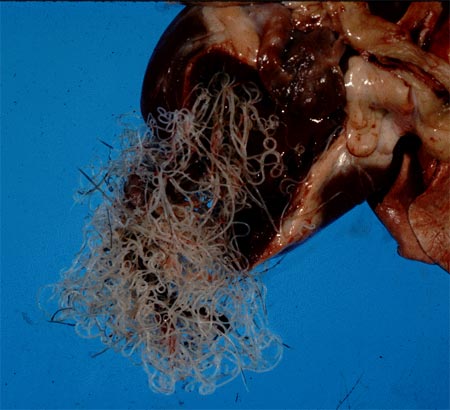
Signs of Heartworms
Because heartworms tend to occupy the more important organs, you may notice dysfunctions of the heart, lungs, and even the liver and kidneys, because the heartworms will cause damage to tissues of the organs, usually causing the cough, overall weakness, and anemia.
Heartworms can clog the heart and major blood vessels, and because of this, it can cause restricted blood flow to your dog's organs, which will cause the lack of exercise or excitement.
The disease can also, cause dysfunctions with the valves of the heart, which can also cause the dog to slow down.
Usually, once infected, dogs don't show symptoms for up to two years, and by the time you notice the symptoms, your dog has progressed heartworm disease.
Here are the general signs and symptoms of the different stages of heartworm disease.
Acute: No abnormal signs
Mild: A slight cough
Moderate: exercise intolerance, cough, and abnormal lung sounds
Severe: exercise intolerance, cough, breathing difficulties, abnormal lung sounds, enlargement of the liver, temporary loss of consciousness due to poor blood flow to the brain, fluid accumulation in the abdominal cavity, abnormal heart sounds, weight loss, loss of stamina, and even death
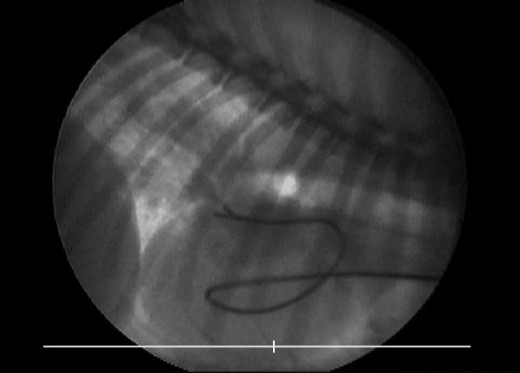

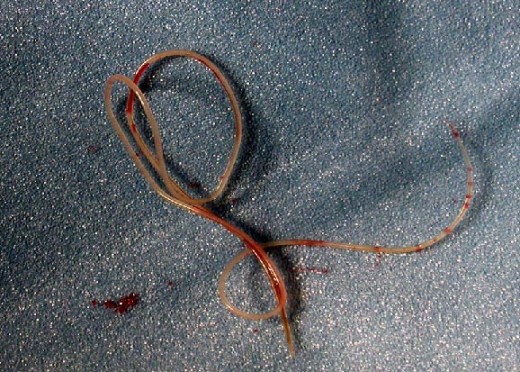
Diagnosing and Treating Heartworms
A simple blood test can be preformed to diagnose heartworm disease. You vet will run a filtration test to determine whether there are microfilariae in your dog's bloodstream, but even if you dog may be infected with heartworms, he may not have any microfilariae in his bloodstream. This is why veterinarians will also perform an occult test, which will show whether there are worms in the heart.
If you vet notices that, in deed, your dog has heartworms, he will probably want to perform an x-ray so that he can determine the severity of the disease.
Usually depending on the severity of the disease, your doctor will either prescribe that you start the dog on a preventative (this is only the case for very acute heartworms), or, the typical answer is to treat the disease with an arsenic-based drugs.
The treatment for heartworm disease is a very serious treatment, as it can kill your dog. You want to keep your dog very low-key for the full term of the treatment- loads of rest and little excess stimulation or excitement. Now, depending on severity of the disease, your dog may not want to move around or be active, which is actually a good thing.
The drugs that are used to treat heartworms, kill the worms and all microfilaria. The dog's liver and kidneys will then work on overtime to rid the dog's body of the bi-products of the drugs and the dead heartworms and microfilariae.
After the treatments, you dog may suffer nausea, vomiting, and even lack of appetite. Usually, depending on the severity, your dog will get 2 shots of the drugs, within a few week span.
It's not uncommon that the vet give the dog 4 shots (halving the normal 2 amounts) and giving each shot a few weeks a part from each other, so that the treatment is spread out and less potent. Usually, this is the case for dogs with severe heartworms.

Heartworm Prevention
Preventing heartworm disease is so much cheaper and healthier than having to treat the disease.
There are three different forms of heartworm preventatives that you can buy.
- Heartgard Plus- Comes in small, medium, and large forms for the different weight levels of dogs. Heargard is a chewable pill that has a beef flavor. Heartgard not only prevents heartworms, but it can help control more species of roundworms and hookworms than any of the other preventatives.
- Valuheart- Valuheart is available in for small, medium, and large dogs. The product prevents heartworms by eliminating them in their development stage.
- Sentinel- This product is meant to prevent heartworms and fleas, as well as hookworms, roundworms, and whipworms.
All three preventatives must be administered monthly (every days).
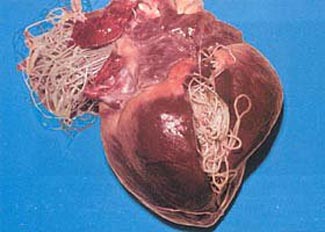
Natural Heartworm Prevention
In general, heartworm preventatives have tons of adverse effects, such as liver problems, vomiting, diarrhea, depression, lethargy, seizures, tremors, paralysis, autoimmune disorders, thyroid problems, fever, dizziness, coughing, nerve damage, and several other side effects. Some veterinarians even claim that long-term heartworm preventatives can cause liver and kidney disease, skin allergies, and other cancers.
For these reasons, you may want to find a natural alternative to the heartworm preventatives commonly sold by most veterinarians.
Typically, you can ward off mosquitoes with various herbs and natural oils that have anti-parasitic properties. These usually ward off mosquitoes, fleas, and ticks.
A few herbs that you may want to try as natural heartworm prevention, include
- Black Walnut (Juglans nigra)
- Clove Flower Buds (Eugenia caryophyllata)
- Garlic (Allium sativum)
- Mugwort (Artemisia vulgaris)
- Spearmint Herb (Mentha spicata)
- Turmeric Root (Curcuma longa)
- Wormwood (Artemisia annua)
You'll also want to make sure that your dog has a healthy diet, a strong immune system, and good blood circulation. Mosquitoes are less likely to bite healthy dogs, but if they do, a healthy dog will have the strong immune system that can fight off the microfilariae before they become worms. And, if your dog has good circulation, the microfilariae may not have the chance to lodge itself within the heart or lungs.
Don't leave your dog's health up to chance, though. You want to find some preventative that will work for your dog. Talk with an "alternative" veterinarian for more natural heartworm prevention methods.
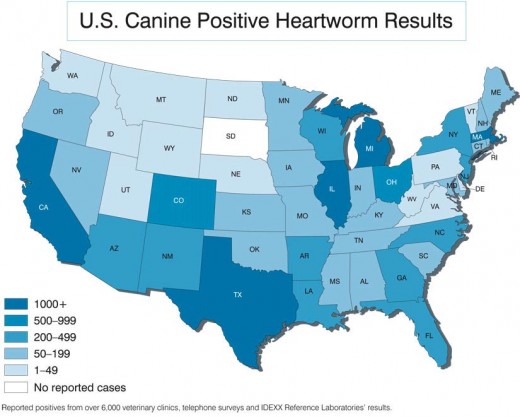
Disclaimer: Please be aware that the advice in this article should in no way replace that of a licensed veterinarian. If you have any questions or concerns, you should consult a veterinarian.





